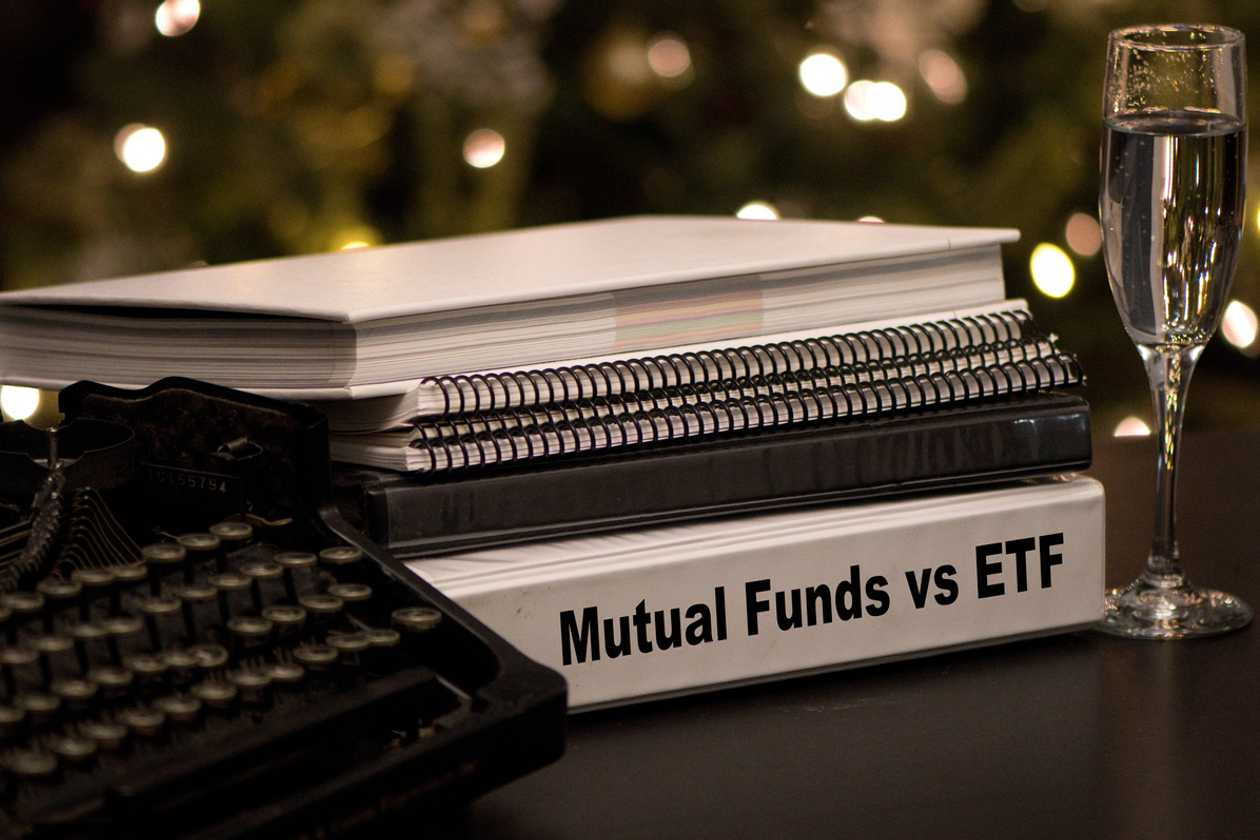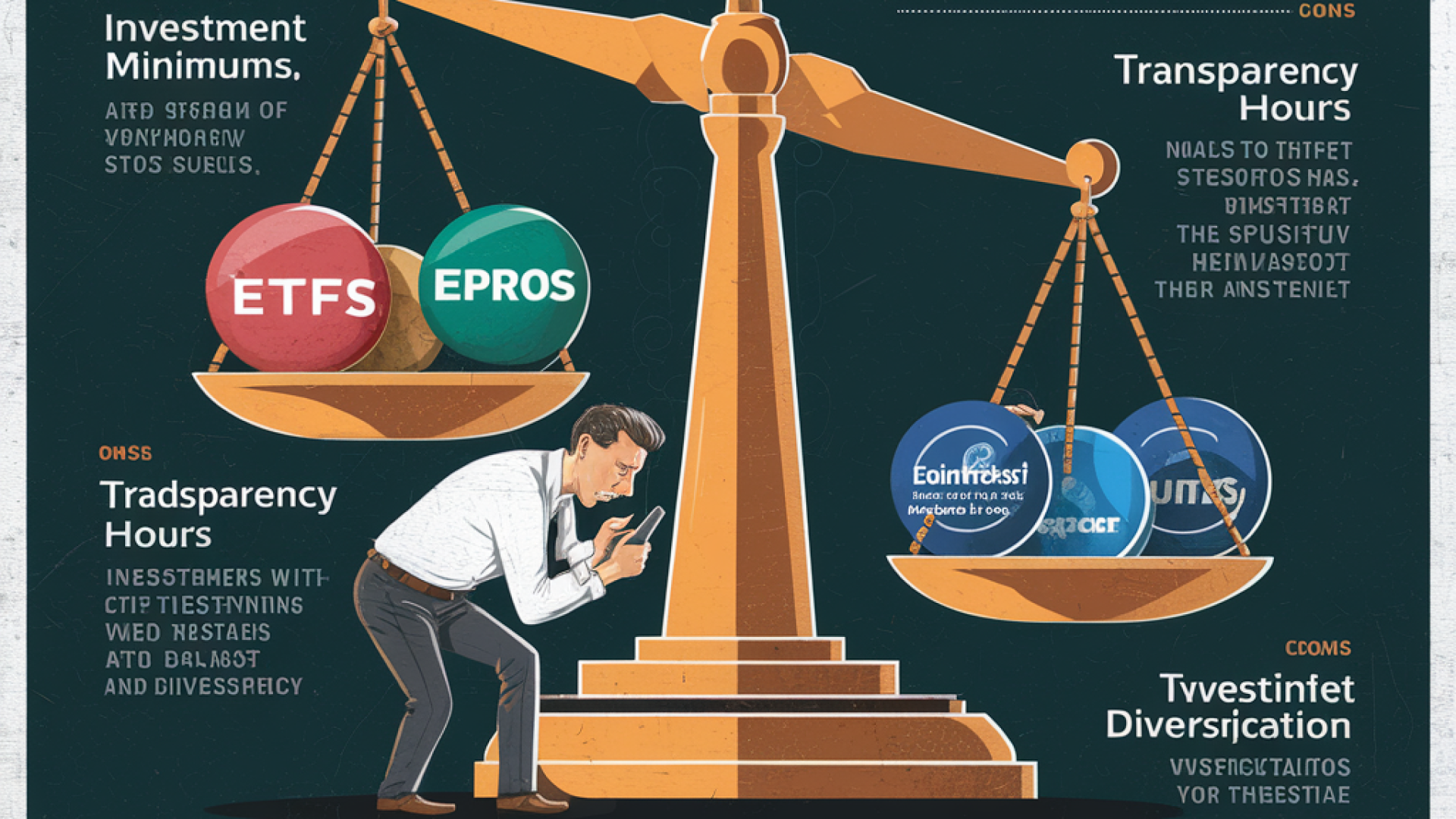When choosing between ETFs vs mutual funds, consider factors like fees, taxes, and risk. Understanding the differences helps in making the right investment decision.
ETFs offer benefits such as lower fees, tax efficiency, and trading flexibility, while mutual funds may provide active management and a diverse investment portfolio. Selecting the appropriate investment vehicle depends on your financial goals, risk tolerance, and investment preferences. Evaluating factors like expense ratios, liquidity, and investment strategies can help determine which option aligns best with your objectives.
Both ETFs and mutual funds have their advantages and disadvantages, so it’s essential to conduct thorough research and seek professional advice to make an informed decision that suits your specific financial needs.

Credit: time.com
Understanding The Difference
When considering investment options, it’s essential to comprehend the disparities between ETFs and mutual funds. While ETFs are valued based on stock market prices, mutual funds are priced according to their net asset value (NAV) at the end of each trading day.
Both investment vehicles have their own distinct advantages and drawbacks, making it crucial to carefully assess and select the most suitable option for your investment goals.
Key Characteristics Of Etfs
ETFs are traded on stock exchanges, allowing for intraday trading.
ETFs typically have lower expense ratios compared to mutual funds.
ETFs are passively managed and aim to replicate the performance of an underlying index.
Key Characteristics Of Mutual Funds
Mutual funds are priced based on their net asset value (NAV) at the end of each trading day.
Mutual funds are actively managed by professional fund managers.
Mutual funds may have higher expense ratios due to active management and administrative costs.
Costs And Fees
When it comes to investing in financial markets, it is crucial to consider the costs and fees associated with each investment vehicle. Whether you are looking to invest in ETFs or mutual funds, understanding these costs can greatly impact your investment returns and overall financial goals.
Expense Ratios
Expense ratios play a vital role in determining the overall costs of investing in ETFs or mutual funds. An expense ratio is a measure of the fees charged by an investment company to manage and operate a fund. It is expressed as a percentage of the fund’s assets under management (AUM).
ETFs typically have lower expense ratios compared to mutual funds. This is because ETFs are passively managed and aim to replicate specific market indices, resulting in lower management fees. On the other hand, mutual funds are actively managed, which involves a team of managers making investment decisions on behalf of the fund. These active management strategies often lead to higher expense ratios.
By choosing an ETF with a lower expense ratio, investors can potentially save more on fees and improve their overall investment returns. It is important to consider expense ratios when comparing different investment options to ensure you are getting the best value for your money.
Tax Efficiency
Tax efficiency is another crucial factor to consider when choosing between ETFs and mutual funds. ETFs generally have an edge over mutual funds in terms of tax efficiency, thanks to their unique structure.
ETFs are designed to minimize capital gains distributions, which can trigger taxes for investors. Unlike mutual funds, which actively buy and sell securities within the fund, ETFs allow investors to buy and sell shares directly on the stock exchange. This feature enables investors to have more control over their taxable events, as they only incur taxes when they sell their ETF shares.
On the other hand, mutual fund investors may face capital gains taxes due to the buying and selling activities within the fund. This can be particularly burdensome for investors in actively managed mutual funds, where frequent trading of securities occurs.
By investing in ETFs, individuals can potentially reduce their tax liability and retain more of their investment gains. However, it is important to consult with a tax advisor or financial professional to fully understand the tax implications of each investment option based on your unique circumstances.
Trading Flexibility
In the realm of investment vehicles, Trading Flexibility is paramount. Let’s delve into the nuances of trading flexibility offered by ETFs and mutual funds.
Intraday Trading
ETFs allow intraday trading, enabling investors to buy and sell throughout the trading day at market prices.
Liquidity
Liquidity is a key advantage of ETFs, offering easy access to funds as they can be traded on major exchanges.
Comparison:
| Aspect | ETFs | Mutual Funds |
|---|---|---|
| Trading Hours | Traded throughout the day | Traded once daily after market close |
| Accessibility | Traded on exchanges | Transacted directly with fund providers |
ETFs offer flexibility and liquidity advantages over mutual funds, making them an appealing choice for active traders and investors seeking quick access to their investments.

Credit: fastercapital.com
Risk And Return
When it comes to investing, it is important to carefully consider the level of risk and potential return associated with different investment vehicles. In this section, we will explore the risk and return factors of ETFs and mutual funds, helping you make an informed decision on the right investment vehicle for you.
Volatility
Volatility refers to the degree of fluctuation in the value of an investment over time. Both ETFs and mutual funds can experience volatility, as their value is influenced by the performance of the underlying assets they hold. However, ETFs tend to be more volatile compared to mutual funds.
One reason for this is that ETFs are traded on stock exchanges throughout the day, leading to more price fluctuations. On the other hand, mutual funds are priced based on their net asset value (NAV) at the end of each trading day.
Performance Tracking
Tracking the performance of your investments is crucial in evaluating their success and making informed decisions. Both ETFs and mutual funds provide performance tracking tools, but there are slight differences in their availability and ease of use.
ETFs, being traded on stock exchanges, offer real-time price updates, making it easy for investors to track their performance throughout the trading day. On the other hand, mutual funds typically provide daily or periodic updates on their NAV, which may not be as frequent as the real-time updates of ETFs.
It is important to consider the level of performance tracking that meets your investment goals and preferences. If you prefer real-time updates and more actively managing your investments, ETFs may be a suitable choice. However, if periodic updates suffice and you prefer a more hands-off approach, mutual funds may be the better option.
Overall, understanding the risk and return factors of ETFs and mutual funds is crucial in making the right investment decision. Consider your risk tolerance, investment goals, and preferences when choosing between the two. Remember to diversify your investments and consult with a financial advisor if needed to create a well-rounded investment portfolio.
Investment Strategies
When considering investment strategies, it’s important to weigh the benefits of ETFs and mutual funds. ETFs offer lower fees and tax advantages, while mutual funds provide managed diversification and more accessibility. Choosing the right investment vehicle depends on your financial goals and risk tolerance.
Investment Strategies
When considering investment strategies, it’s essential to evaluate the key differences between exchange-traded funds (ETFs) and mutual funds. Two crucial aspects to consider are the passive vs. active management and diversification opportunities offered by these investment vehicles. Let’s dive into these strategies to gain a better understanding of how they can impact your investment decisions.
Passive vs. Active Management
ETFs and mutual funds employ distinct management approaches. ETFs generally follow passive management, mirroring a particular market index. This passive strategy aims to match the index’s performance, offering investors a cost-effective and straightforward approach to diversification.
On the other hand, mutual funds embrace active management, where fund managers aim to outperform the market by selecting individual securities. This strategy involves in-depth research and analysis to identify potential opportunities for higher returns, often accompanied by higher fees.
Diversification Opportunities
Both ETFs and mutual funds provide diversification benefits, allowing investors to spread their capital across various assets. ETFs offer diversification across an entire index, sector, or asset class, providing broad exposure to multiple stocks or bonds within a single investment.
Likewise, mutual funds also offer diversification but through a professionally managed portfolio of various securities. This can result in lower risk through broader exposure to multiple companies and industries within a single fund.
In conclusion, understanding the differences in investment strategies between ETFs and mutual funds can help investors make informed decisions aligned with their financial objectives. Whether you prefer a passive or active approach and seek broad diversification, selecting the right investment vehicle is crucial for your long-term financial success.

Credit: changelly.com
Converting Between Investment Vehicles
When considering investment vehicles, it’s essential to understand the potential of converting from one to another. Whether converting from mutual funds to ETFs or vice versa, there are various factors to take into account. Let’s explore the considerations for converting between these investment vehicles.
Considerations For Converting From Mutual Funds To Etfs
When contemplating the transition from mutual funds to ETFs, investors should first examine the expense ratios associated with their mutual fund investments. High expense ratios can diminish overall returns, and converting to ETFs with lower expense ratios may be beneficial. Moreover, for those facing unwelcome tax implications due to capital gains distributions with mutual funds, ETFs can offer a tax-efficient alternative. Additionally, investors in indexed mutual funds can typically find equivalent ETFs that track the same benchmarks, providing a seamless shift from one investment vehicle to another.
Considerations For Converting From Etfs To Mutual Funds
Conversely, individuals who are contemplating the switch from ETFs to mutual funds may have different considerations. While ETFs are known for their intraday trading flexibility, some investors may find themselves desiring the traditional end-of-day trading characteristic of mutual funds. Additionally, for those who prioritize simplicity and prefer to avoid the complexities of trading ETFs on exchanges, mutual funds may offer a more straightforward investment method. Furthermore, investors seeking more hands-on management and a more active investment approach may find mutual funds to be a more suitable option.
Choosing Based On Market Conditions
The choice between ETFs and Mutual Funds can be influenced by the prevailing market conditions. Understanding how each performs in different market scenarios is crucial for making informed investment decisions.
Market Upturn
- During a market upturn, ETFs tend to perform well as they are traded like stocks, allowing investors to capitalize on the positive momentum.
- Mutual Funds may also benefit from market upswings but may not offer the same level of flexibility as ETFs.
- Investors looking to take advantage of a bullish market may find ETFs more suitable for quick trading and profit-taking.
Market Downturn
- In a market downturn, Mutual Funds may show more stability compared to ETFs, as they are priced based on the net asset value at the end of each day.
- ETFs, being traded on the stock market, are more susceptible to market volatility during downturns.
- Investors seeking a safer haven during turbulent times may prefer the stability offered by Mutual Funds over the fluctuating nature of ETFs.
Selecting The Right Option
Choosing between ETFs and mutual funds can be a crucial decision for investors. While both options offer diversification, ETFs often have lower fees and are traded like stocks, whereas mutual funds have a higher expense ratio and are valued based on their net asset value.
Investors should carefully evaluate their investment goals and risk tolerance before making a decision.
Factors To Consider
When it comes to selecting the right investment option between ETFs and mutual funds, there are several important factors to consider. These factors will help you make an informed decision based on your personalized investment philosophy and financial goals.
Personalized Investment Philosophy
Your personalized investment philosophy is a key factor in choosing between ETFs and mutual funds. It reflects your beliefs about risk tolerance, investment objectives, and long-term financial goals. Understanding your investment philosophy will guide you in selecting the investment option that aligns with your unique needs.
There are a few key questions you should ask yourself to determine your investment philosophy:
- What is your risk tolerance? Are you comfortable with a higher level of risk for potentially higher returns, or do you prefer a more conservative approach?
- What are your investment objectives? Are you looking for long-term growth, regular income, or both?
- What is your time horizon? Are you investing for the short-term or long-term?
- Do you prefer actively managed funds or passive index-tracking funds?
- What are your tax considerations? Do you prioritize tax efficiency in your investments?
By answering these questions, you can develop a clear understanding of your personalized investment philosophy, which will guide your decision towards the right investment option.
Etfs Vs. Mutual Funds: Which To Choose?
Now that you have considered your personalized investment philosophy, let’s dive deeper into the comparison between ETFs and mutual funds.
| ETFs | Mutual Funds |
| Traded on stock exchanges like individual stocks. | Traded at the NAV (Net Asset Value) at the end of each trading day. |
| Offer intraday trading and can be bought or sold at market prices throughout the trading day. | Can only be bought or sold at the end-of-day NAV price. |
| Often have lower expense ratios than mutual funds. | May have higher expense ratios, especially for actively managed funds. |
| Can be tax-efficient due to the creation and redemption process. | May have capital gains distributions, potentially causing tax implications. |
| Provide transparency as their holdings are disclosed daily. | Holdings are disclosed quarterly or semi-annually. |
Consider the above characteristics when making your decision. If you value flexibility, intraday trading, and lower expense ratios, ETFs may be a suitable choice. On the other hand, if you prefer the simplicity of end-of-day trading and are comfortable with potentially higher expense ratios, mutual funds can be a good option. Ultimately, it’s crucial to remember that the right choice depends on your own investment philosophy and financial objectives.
Frequently Asked Questions
Why Choose An Etf Over A Mutual Fund?
Choose an ETF over a mutual fund for lower expenses, greater flexibility, and tax efficiency. ETFs trade like stocks.
What Is The Downside Of Etfs?
The downside of ETFs includes potential fees, deviations from asset values, tax optimization issues, and inherent investment risks.
Should I Convert My Mutual Fund To An Etf?
Converting your mutual fund to an ETF is advisable if you’re paying high fees or taxes. ETFs offer similar benefits without the drawbacks of mutual funds.
Why Might Someone Choose To Invest In An Etf Rather Than In Stock?
Investing in an ETF offers diversification, lower costs, and ease of trading compared to stocks.
Conclusion
Deciding between ETFs and mutual funds should align with your specific investment goals. Consider the fees, taxes, and risks associated with each option before making a decision. Both investment vehicles offer unique benefits, so choose wisely based on your financial objectives.

Olga L. Weaver is a distinguished figure in both the realms of real estate and business, embodying a unique blend of expertise in these interconnected domains. With a comprehensive background in real estate development and a strategic understanding of business operations, Olga L. Weaver has positioned herself as a trusted advisor in the complex intersection of property and commerce. Her career is marked by successful ventures in real estate, coupled with a keen ability to integrate sound business principles into property investments. Whether navigating the intricacies of commercial transactions, optimizing property portfolios, or providing strategic insights into market trends, Olga L. Weaver’s expertise encompasses a wide spectrum of both real estate and business-related topics. As a dual expert in real estate and business, she stands as a guiding force, empowering individuals and organizations with the knowledge and strategies needed to thrive in these intertwined landscapes. Olga L. Weaver’s contributions continue to shape the dialogue around the synergy between real estate and business, making her a respected authority in both fields.
